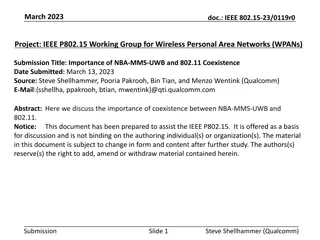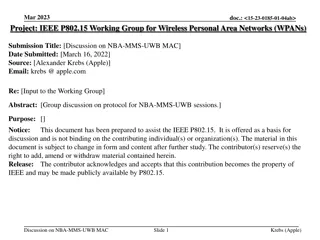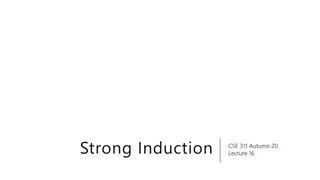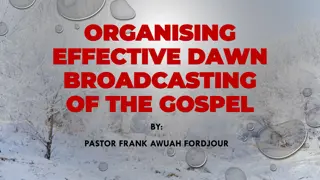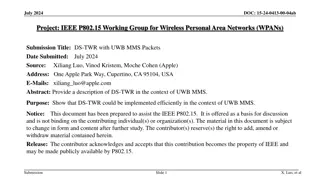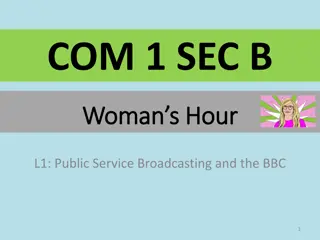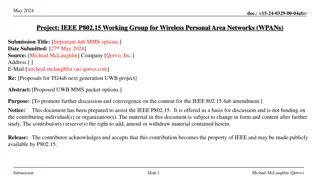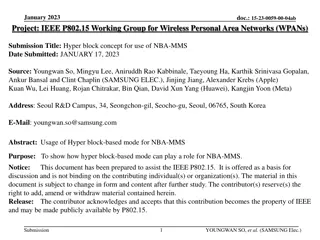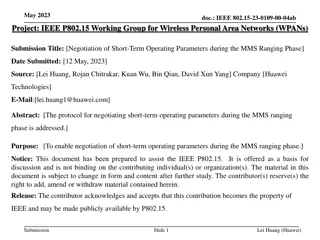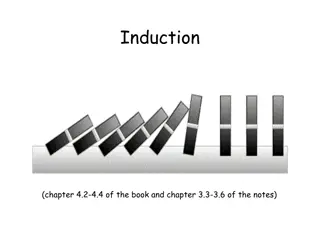
Role of Authority in Broadcasting Sector Regulations
Explore the role of the authority in regulating the broadcasting sector, including the reasons for regulation, regulatory instruments, licensing frameworks, and programming codes to protect consumers, promote inclusiveness, contribute to development, and ensure national unity and cohesion.
Download Presentation

Please find below an Image/Link to download the presentation.
The content on the website is provided AS IS for your information and personal use only. It may not be sold, licensed, or shared on other websites without obtaining consent from the author. If you encounter any issues during the download, it is possible that the publisher has removed the file from their server.
You are allowed to download the files provided on this website for personal or commercial use, subject to the condition that they are used lawfully. All files are the property of their respective owners.
The content on the website is provided AS IS for your information and personal use only. It may not be sold, licensed, or shared on other websites without obtaining consent from the author.
E N D
Presentation Transcript
OVERVIEW OF THE ROLE OF THE AUTHORITY WITH RESPECT TO THE BROADCASTING SECTOR 20th-22ndFeb. 2017 Eng. Leo K. Boruett Director/Multimedia Services (D/MMS)
Contents Why regulate broadcasting Regulatory instruments Broadcasting services overview Broadcasting Licensing Framework Highlights of the Programming Code Main issues on focus
Why Regulate Broadcasting i. protect consumers, minors ii.foster inclusiveness - PWDs iii.contribute to development - local content iv.use of Public resources such as frequency spectrum v.address competition/market barrier issues vi.promote national unity and cohesion.
Regulatory Instruments Kenya Information and Communications Act 1998, as amended Kenya Communications (Broadcasting) Regulations Rev. 2010 Licence Obligations Programming Code -Section 46H (d) of KICA CA to prescribe Complaints Handling procedure
Broadcasting services overview Public TV and Radio Broadcasting Services Commercial Free-to-air TV and Radio Community Free-to-air Radio Terrestrial Subscription Broadcasting Satellite Subscription Broadcasting Cable Subscription Broadcasting
Broadcasting services overview 2 Common Carrier BSDs 59 Licensed digital TV broadcasting content providers & 175 FM broadcast stations 3 self- provisioning BSDs 66% population coverage
Broadcasting Licensing Framework CLC CONSIDERATION APPLICATION AWARD OF LICENCE BOARD CONSIDERATION
The Programme Code Section 46H (d) of KICA vests CA to prescribe a Programme Code Code sets standards for the time and manner of programmes to be broadcast by licensees Principles: i. Protection of minors ii. Public interest iii. Protection of the individual
Protection of minors Offensive Language Violence Explicit Sexual Content http://exchangedownloads.smarttech.com/public/content/c2/c2696458-1937-4110-9bde-b96c695cebca/previews/medium/0001.png Information & ratings Nudity Watershed period
Public Interest Access by PWDs Complaints mechanism Taste & decency Local Expression
Public Interest contd Crime methods Crisis situations Incitement of Hatred Flashing lights Epileptic seizures
Protection of the individual http://nibman20.files.wordpress.com/2010/12/interview.jpg?w=300h=291 Intrusion into privacy Right of Reply Advertising Truth, decency, honesty, etc.
Complaints Handling Inform audiences of the existence of a complaint mechanism Inform audiences HOW to lodge a complaint e.g. SMS, Email etc. File summary on complaints handled at end year
Main Issues on Focus Why regulate broadcasting Licensing TV broadcasters in Digital platform Increase digital platform Coverage Local Broadcast Content
Thank You Consumer Rights in Broadcasting Services Q&A








